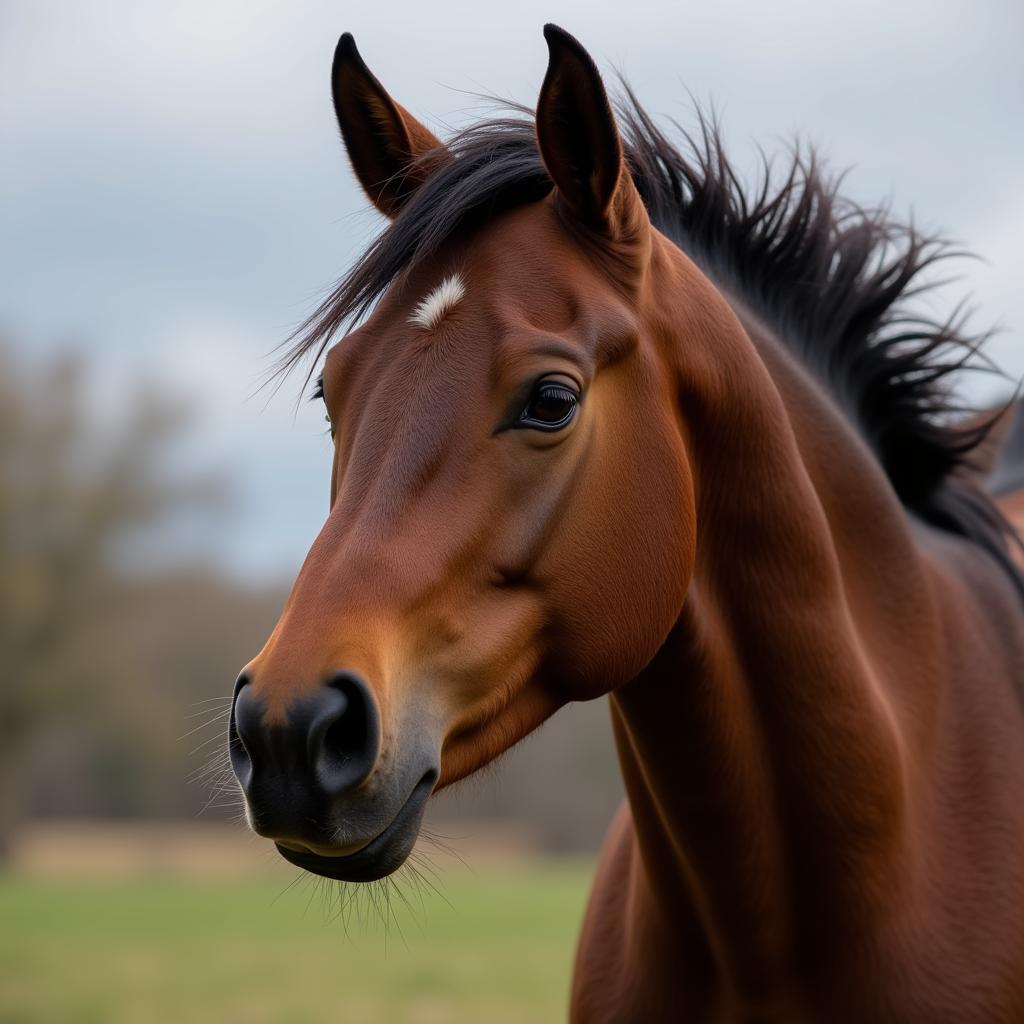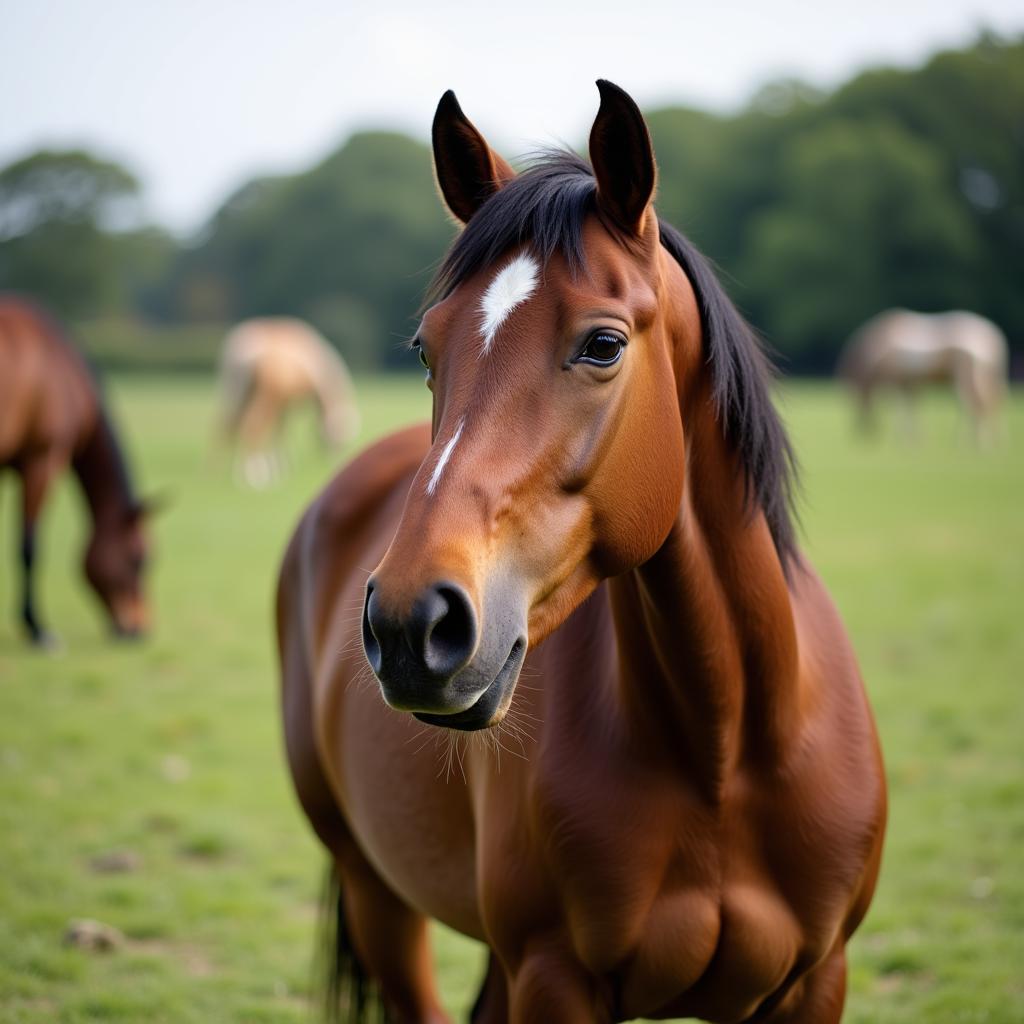Achieving total calm and focus in your horse is crucial for training, performance, and overall well-being. This involves understanding your horse’s individual needs, recognizing potential stressors, and implementing strategies to create a positive and supportive environment.
Understanding the Importance of Calm and Focus
A calm and focused horse is more receptive to learning, exhibits improved performance, and is generally safer to handle. This state of mind allows them to concentrate on the task at hand, whether it’s navigating a complex trail ride or performing intricate dressage movements. When a horse is anxious or distracted, their ability to learn and perform diminishes, potentially leading to frustration and dangerous situations. A focused horse is also more likely to trust their rider, deepening the bond between horse and human.
Identifying Stressors in Your Horse’s Environment
Horses are prey animals, meaning they are constantly scanning their environment for potential threats. Recognizing stressors is the first step towards achieving total calm and focus. Common stressors include changes in routine, loud noises, unfamiliar objects, and social isolation. Even seemingly minor changes, like a new feed bucket or a different stall neighbor, can trigger anxiety in some horses. Observing your horse’s body language, such as ear position, tail swishing, and overall demeanor, can provide valuable insights into their emotional state.
 Horse Showing Signs of Stress
Horse Showing Signs of Stress
Techniques for Promoting Calm and Focus
There are numerous strategies you can employ to help your horse achieve a state of calm and focus. These range from management practices to training techniques and even nutritional considerations.
Management Practices for a Calm Environment
Creating a calm and predictable environment is essential for promoting relaxation. This involves establishing consistent routines for feeding, turnout, and exercise. Providing ample opportunities for social interaction with other horses can also significantly reduce stress and promote a sense of security. Minimizing exposure to loud noises and sudden movements can further contribute to a peaceful atmosphere.
Training Techniques for Enhanced Focus
Training plays a vital role in developing focus and concentration. Positive reinforcement methods, such as rewarding desired behaviors with praise and treats, are highly effective. Groundwork exercises, like lunging and leading, can help improve a horse’s responsiveness and attention span. Introducing new challenges gradually and avoiding overwhelming situations are crucial for building confidence and preventing anxiety.
Nutritional Considerations for a Calm Disposition
Nutrition plays a crucial role in a horse’s overall well-being and can influence their temperament. A balanced diet with adequate levels of vitamins and minerals is essential. Certain supplements, such as magnesium and calming herbs, can be beneficial for horses prone to anxiety. Consult with your veterinarian or an equine nutritionist to determine the best dietary approach for your horse’s individual needs.
What Are the Signs of a Calm and Focused Horse?
A calm and focused horse will typically exhibit soft eyes, relaxed ears, and a steady breathing pattern. They will be attentive to their handler or rider, readily responding to cues and exhibiting a willingness to work. A relaxed posture, with a lowered head and a loosely swinging tail, is another indicator of a calm demeanor.
How Can I Help My Anxious Horse?
If your horse is exhibiting signs of anxiety, it’s essential to identify and address the underlying cause. This may involve removing stressors from their environment, implementing calming training techniques, or consulting with a veterinarian or equine behaviorist. Patience and consistency are key to helping an anxious horse find their calm.
 Relaxed and Focused Horse in Paddock
Relaxed and Focused Horse in Paddock
Conclusion
Achieving total calm and focus in your horse is a journey that requires understanding, patience, and consistent effort. By recognizing stressors, implementing calming strategies, and creating a positive environment, you can help your horse reach their full potential and strengthen the bond you share. Remember, a calm and focused horse is a happy and healthy horse.
FAQ
-
What are some common signs of stress in horses? Common signs include pinned ears, tail swishing, pawing, and increased vocalizations.
-
Can diet affect a horse’s focus? Yes, a balanced diet is crucial for overall well-being and can influence temperament.
-
How can I create a calm environment for my horse? Establish consistent routines, minimize exposure to stressors, and provide opportunities for social interaction.
-
What training methods are best for promoting focus? Positive reinforcement and groundwork exercises are effective in enhancing focus and concentration.
-
Are there supplements that can help calm a horse? Certain supplements, like magnesium, can be beneficial, but consult with a veterinarian first.
-
How long does it take to achieve total calm and focus in a horse? It varies depending on the individual horse and the methods used, but consistency is key.
-
What should I do if my horse remains anxious despite my efforts? Consult with a veterinarian or equine behaviorist for professional guidance.
Common Scenarios and Questions
-
Scenario: My horse gets anxious during trail rides. Question: How can I desensitize my horse to new environments?
-
Scenario: My horse is easily spooked during training. Question: What groundwork exercises can help improve focus and reduce spooking?
Further Reading and Resources on Justus Horses USA
- Article on Horse Behavior and Training
- Guide to Equine Nutrition
Need support? Contact us at Phone: 0772127271, Email: [email protected] or visit us at QGM2+WX2, Vị Trung, Vị Thuỷ, Hậu Giang, Việt Nam. We have a 24/7 customer service team.